- Home
- Saul Tanpepper
Iceland: An International Thriller (The Flense Book 2) Page 3
Iceland: An International Thriller (The Flense Book 2) Read online
Page 3
The man rolled up his sleeve to show her, but there was no evidence of the injection.
"It is same medicine they give my brother in Mersin," he told her.
"Mersin? What is that?"
"City on coast of Turkey. They give to everyone then, too, sick or not. Except me. I tell them no, but my brother is very sick ever since we leave Syria, like man over there, Sharif, coughing and spitting. They say he need it and it will make him better. He will die anyway without it. Two months he is ill because we have no medicine, no clean food or water, always traveling and sleeping outside. So, he take it. I tell him no, but he is not listening to me because he is little brother and he always knows better than Mahdi. He is so sick we miss boat and must stay in Mersin. Then, after only one day, he get better, and so I know that medicine must be good."
"So, you let them give it to you then?"
He shook his head. "I was too late. We get on truck to go to Izmir instead, where we pay for seat on different boat. Izmir is much more far north, near Greece. We try to go to Athens."
"Is that where the boat took you?"
He nodded. "It is a short trip on fast boat. Only less than one day. But when we arrive, we find already too many others like us, so we pay another man to take us on truck. We go on many roads for many miles through many country, until we are finally in Germany.
"But they do not like us there. We stay only for one month, hoping to find rest of family. Then, finally, we must come here. And now we are stuck and we have no more money. It is cold and wet and we are alone."
Once more, the sick man broke out into another coughing fit. He leaned over again, hacking. A thick clot of red-tinged sputum fell from his lips and landed on the tops of his worn shoes.
The two men standing on either side tried to hold him steady. They banged on his back with their fists and spoke encouragingly, but his coughing only grew worse. He sucked in a breath, wheezing loudly, and groaned in agony.
"Sharif will be better tomorrow," the man assured Angel. "You leave now."
But then a cry rang out from the group, and when they looked over again, the sick man lay on the ground, quivering and gasping for air.
Chapter Three
The sick man's friends carried him back to his tent, where he lapsed into a semi-conscious state, his fitful snores punctuated by fits of coughing and groans of misery. The smell and discharge from his mouth and nose were gut-wrenching.
Pneumonia, Angel thought. Yet no one would allow her to call an ambulance. Nor would they accept the acetaminophen she offered for his fever. It was as if they were afraid something worse would happen if they did.
"Your friend is very sick with a lung infection," Angel told the man she had spoken with earlier, once the tent flap was zipped shut.
She pulled him to the side, away from the others, hoping he might be easier to convince alone. Divide and conquer, as they say. But she wasn't sure she'd get very far with any of them. Their distrust in outsiders, especially locals, ran strong. There was a lot of resentment on both sides.
"He will be better soon," the man continued to insist, despite every indication he was getting worse.
"He is going to die unless he gets to a hospital. And soon. Look, I know there are free emergency services for refugees. They can do a blood test and—"
"No! You say you are not from hospital, so why do you want him to go there so much? Are you from government?"
"I told you already. My name is Angel de l'Enfantine. I am a medical investigative journalist. The longer that man remains untreated, the more he will spread his infection to others here. It could be the flu. It could also be tuberculosis. Or worse."
"He not make others sick!"
"I think you should—"
"I told you no! No hospital. No blood test!"
She spun away from him in frustration, clenching her fists. Her eyes stung with tears, which only made her all the more angry. "Please," she begged, turning back around when she had herself under control again. "You need to trust me!"
"Why? You come here asking questions! Why? Who are you?"
Through considerable patience, and with Omar's assistance communicating in Arabic, he eventually accepted that her intentions were as altruistic as she claimed. She promised that she would do nothing to threaten their presence in France.
At last he admitted the source of his wariness. "It is because of Farid," he told her in whispers. "Farid Haddad. He is my brother."
"And your name is?"
"Mahdi. Mahdi Haddad. It is because of medicine people. When they come, they tell us to stay away from hospitals. Not safe, they say. And everything is mostly okay and we don't need hospital anyway. But then, some new people arrive three days ago. Iranian. One woman and one man, and she is with child and having a terrible sickness in her stomach and bleeding. Very weak. Farid tell her he will take them to hospital. I warn him not to go. I beg him to wait because he is not supposed to go or he will be taken away. Wait three days, I tell him. But he is not listening to Mahdi. He say people will die because she is bleeding and maybe baby die, too. He cannot let that happen."
"What happened then?"
"Because he cannot wait for people to give medicine in arm, he is gone."
"Do you know what kind of medicine it was?"
He shook his head. "Black medicine."
"Black? As in black market? Illegal?"
"Black, as in very dark."
Her throat constricted, and for a moment she couldn't speak. "What do you mean dark?"
His eyes narrowed. "Why you keep asking?"
"Because I have never heard of any type of black medicine."
"If you come here early today," he told her indignantly, "then you would see it. They tell us medicine in hospital no good. They say not to go there because it is too dangerous for us, make us sick."
Angel frowned. "That doesn't make any sense."
"You are French woman. You live here. You should know. People are afraid of refugees, say we are no good, bring danger. But we are not jihadi as you think. We do not spread sickness. We only come here because we want to live in peace. But the black medicine people say your government will take anyone who is sick and send home again because afraid. To Syria. To Iran. Turkey. Or some other terrible place, I don't know. Farid not care about that. He say he will be careful. But he is not careful."
"Or maybe this woman was admitted into a hospital, and that is where he is now."
"You not listen! I tell you what is happened. He is gone! They are all gone, disappeared. Anyone who goes to hospital, they are gone, don't come back! I try calling him on phone and he never answer. I think he is taken out of country."
"They wouldn't deport him so quickly. Can you at least tell me which hospital they visited?"
"I don't know anything! I don't know where they are or if they are alive or dead. I think maybe they are sent away. Or maybe they are all put together in some prison. I don't know because he never answers his phone. I am afraid to ask people because I do not want to be sent back, either. This morning, I tell people with medicine what happen. They get very angry, ask same questions as you. No doctors, they say! Government will send us away."
"That's just not true!" Angel protested.
"I tell them same thing I tell you. I don't know!" He grabbed her by the arms. The panic in his eyes was genuine. "I already tell you too much. You must go away now! Go and do not come back."
The rain had stopped, but it had been replaced by a cold fog which somehow made everything feel even damper. Water condensed on every surface and dripped from high above them with greater frequency so that the overpass no longer offered any protection. Angel pulled up the hood of her coat, but it was soaked through. She shivered and longed for the warmth of the heater in her van or a hot bath in her hotel room. But she didn't want to leave the sick man.
She also sensed something bigger was at play here, something that tugged at the raw exposed nerves in her mind and sent spikes of terror through her.
Was she just feeding off the fear these people felt? Were they justified in feeling it, or was it all just some sort of misunderstanding?
And what of the black medicine?
It's not what you think it is, Angel. How could it be?
She needed to focus on what she knew, what made sense, and what she could control, rather than revisiting past horrors.
So, if what he said was true, then why would anyone, especially the very organizations which were supposed to help these poor people, say such patently false things as he claimed? Why would they plant such absurd notions? Why sow such paranoia?
"Have you registered yet as asylum seekers?" she abruptly asked. "You and your brother? The others? If so, then it will be easier to track Farid in the system. And if they are registered, the government will be less likely to send them back. Instead, they are probably in a quarantine facility somewhere."
She could see how torn he was, the desperation in his eyes. He wanted answers. He wanted to trust her.
"Please, Mahdi. I will not do you any harm. I promise."
He sighed. "When we first come here three weeks ago, yes. Police come and tell us we must register. Very long line, and we wait for many hours and days, some standing in the rain and wind without a jacket. That is when I become ill, coughing and sick in my chest. Like Sharif Hosnani over there."
"Is that when they gave you the medicine?"
He hesitated again, then nodded. "Soon after. It is the same medicine. This time I say okay, because I see how it make Farid better so fast. They give it to me, to everyone who already did not have it. Next day, I am all better."
He stopped and studied her face, but she was careful to conceal her skepticism.
Instead, she thought hard, reviewing what she knew for sure. If the woman was contagious, then the health officials would have very likely quarantined them all, including Farid, even if he wasn't showing symptoms.
She was bleeding.
Was it possible she had Ebola? The outbreak in Western Africa was winding down, but—
No, that didn't make sense. They would have quarantined the entire camp. There would have been a massive response.
Finally, she sighed and shook her head. "Since you have both registered, your brother should be in the system. Someone will know where he went, and it is likely the others are with him. I just need to find the right people and ask the right questions."
"You will look for him?" There was a flash of hope in his eyes. "You will help me find him?"
"I cannot promise anything," she said, and took his hand in hers. "I will come back tomorrow and we can start then."
Chapter Four
The last patrons stood up from their table by the bar — Swedish businessmen from the sounds of their conversation — and grabbed their jackets, leaving Angel completely alone in the back of the tiny bistro on a side street off the Rue Saint-Denis. The waiter had disappeared into the kitchen twenty minutes before, and the sound system had been shut off, although the speakers continued to crackle. It was long past time for her to leave.
Yet she remained sitting. She picked at the bread and cheese plate she'd ordered for dinner. They were barely touched. The bread was now dry, and the edges of the cheese had turned translucent. The bottle of red wine on the edge of the table, however, was nearly empty.
She had hoped to numb her pain, but she'd been too slow drinking it and had failed to get any benefit from the alcohol it contained. Now it just felt like her skull was two sizes too big and her skin too tight. Her thoughts were just as sharp as ever, however. The edge of the nebulous terror which had become her constant companion seemed especially keen after the events of the day.
There was nothing left for her to do but return to her hotel and try to sleep. And hope the nightmares wouldn't come.
It was a futile thing to wish for.
Pushing herself up, she glanced down at the wasted food, and she sighed. She didn't know why she'd ordered it. The thought of eating anything had only made her stomach churn and threaten to revolt. It still did. But that's all it was, threats.
You ordered it because you did not want people to see you sitting here alone drinking yourself into a stupor. It looks bad. But if you have food in front of you, you can at least pretend that is not what you are doing.
Sad, really, this little charade. She knew that, yet couldn't seem to stop herself. It's what had become of her life. She couldn't stop this self-destructive spiral she had fallen into.
The staff were banging away in the back, shouting at one another as they shut down the business for the night.
Angel's ears rung from the absence of music, the hard-driving, head-pounding, bass-heavy rhythm that had drawn her in off the street in the first place. The businessmen had come in an hour and a half later, apparently not put off by the volume or the genre. Rather, they seemed to have taken it as a challenge to be even more boisterous.
Angel had welcomed the clamor, welcomed the fact that she could wrap herself in it like a cloak and become invisible in it. That she could just sit there in her tiny, dark, corner booth and not worry about being constantly accosted by some well-meaning waiter or a customer in search of conversation, perhaps as a prelude to a hookup. She doubted they'd find a place such as this one all that conducive to that end.
But now the music was gone, the bistro empty, as empty as the narrow street outside, which suddenly seemed too dark and quiet and ominous. All evening, there had been a steady stream of foot traffic past the front windows, but it had tapered off until there was none. And while it was true that the city never truly slept, the bustle simply became more concentrated in certain areas at such hours, leaving the rest deserted. Like isolated puddles after a rain.
She dropped a hundred euro bill on the table. It far exceeded the cost for the food and drink, yet she didn't want to call for the server or wait for him to process her change. She didn't think she could manage any human interaction at the moment, not without breaking down.
It was a six block walk to the hotel, almost too short for a taxi. Between fifteen and thirty minutes by foot depending on whether the lights were in her favor and how quickly she went. One either strolled through Paris or half-jogged; there was no in-between.
She stepped out, wrapping her sweater about her shoulders, and checked in both directions before heading briskly toward the Rue Saint-Denis. The road ahead was still busy with cars. Lights flashed and sounds leaked to her from that direction. She saw people gathered at intersections— in groups of twos and threes at this late hour. City of Lights, City of lovers and the lonely.
On the narrow side street where the café was located, however, there were no street lamps, only the dull neon glow of the dingy shop signs, and the darkened entryways hiding secrets within the depths of their shadows.
She remembered Shanghai. She kept expecting a man with the wet, gurgling cough and limp to appear, but she refused to succumb to the fear. She wouldn't reach into her handbag to reassure herself. She was safe. No need to be afraid.
Hurrying along, eyes and nose cast downward, she told herself her greatest danger was something much more mundane, the risk of stepping in dog shit. Parisians were notoriously laissez-faire when it came to attending to their pets' business.
And now, at last, onto the Rue Saint-Denis. Weaving around the late-night revelers, joking and smoking. She smelled pot, and it took her back to the early years of her marriage. David had enjoyed the occasional high, though it was Jacques who had fallen more fully under its influence, much to their parents' disappointment. Her brother had done everything he could to pay them back for perceived grievances.
She saw men and women laughing as they cozied up tight against each other, eyes flashing with mirth and unbridled sensuality. Pairs of homosexual men holding hands; women with their arms linked, their own sexuality perhaps not as obvious. An older couple — heterosexual, dignified-looking, hair silver and skin bronzed — strolled lazily along. She caught sight of them up ahead, watched with a d
ull sort of envy as they stopped to peer into a darkened window, perhaps ogling forbidden pastries or some whimsical toy.
A small Egyptian man with his collar pulled up tight appeared out of nowhere. He hurried past her with barely a glance in her direction. He smelled of green peppers and cinnamon.
A siren rose somewhere in the distance, rushed closer before changing course and arcing away again.
The smell of the afternoon rain on the cement, thick and electric, mixed with spoiled food and animal feces. The lingering greasy aroma of the curbside rotisserie carts. Stale air wafting out of the ground from the Metro, warmer than it had been all day.
She crossed the street heading toward the station at Réamur-Sébastopol, but turned down another side road before reaching it. The hotel was just past the Square Émile-Chautemps, a small, secluded park with a fountain and benches. The lights were off.
She listened for the familiar burble, but there was none. The waterworks were also shut off for the night.
Stepping inside the square was like entering a dark room. The canopy from the trees blocked the moonlight and prevented any stray illumination from entering from off the street and the surrounding buildings. The air was noticeably cooler as well, still and silent as a crypt, as if the afternoon's chill had somehow been gathered here.
The heels of her boots sounded a crisp beat as she made her way in. Then, at the packed gravel track encircling the fountain, the clips gave way to a softer crunch.
The whiteness of the old marble structure was a negative shadow in the darkness, an angular shape of walls and surfaces. At the end of the walk a deeper shadow clung. Angel slowed as she approached it. This time, she slipped her hand into her bag, recognizing the shape before her as human. Her fingers tightened around the grip of the pistol she had bought soon after returning from China.

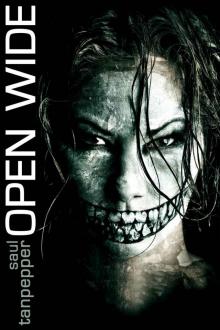 Open Wide
Open Wide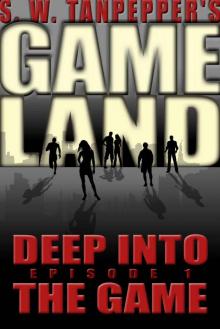 Deep Into the Game: S.W. Tanpepper's GAMELAND (Episode 1) (Volume 1) (S. W. Tanpepper's GAMELAND)
Deep Into the Game: S.W. Tanpepper's GAMELAND (Episode 1) (Volume 1) (S. W. Tanpepper's GAMELAND)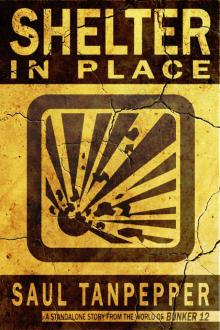 Shelter in Place: A short story from the world of BUNKER 12
Shelter in Place: A short story from the world of BUNKER 12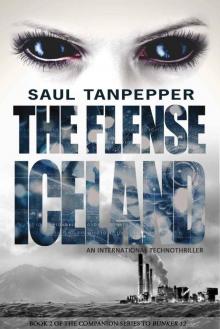 Iceland: An International Thriller (The Flense Book 2)
Iceland: An International Thriller (The Flense Book 2)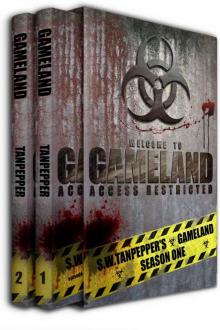 GAMELAND Episodes 1-2: Deep Into the Game + Failsafe (S. W. Tanpepper's GAMELAND)
GAMELAND Episodes 1-2: Deep Into the Game + Failsafe (S. W. Tanpepper's GAMELAND)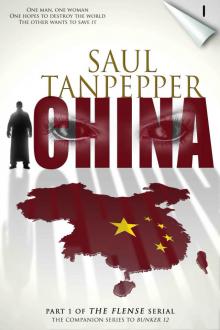 THE FLENSE: China: (Part 1 of THE FLENSE serial)
THE FLENSE: China: (Part 1 of THE FLENSE serial)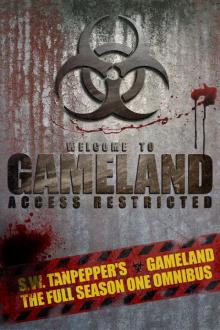 S.W. Tanpepper's GAMELAND, Season One Omnibus
S.W. Tanpepper's GAMELAND, Season One Omnibus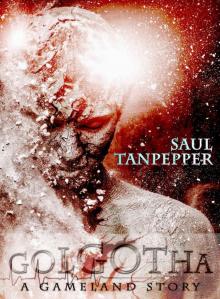 Golgotha: Prequel to S.W. Tanpepper's GAMELAND series (S. W. Tanpepper's GAMELAND companion title Book 1)
Golgotha: Prequel to S.W. Tanpepper's GAMELAND series (S. W. Tanpepper's GAMELAND companion title Book 1)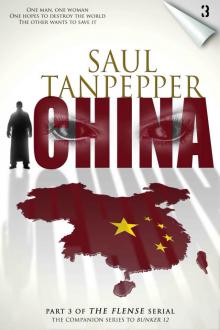 THE FLENSE: China: (Part 3 of THE FLENSE serial)
THE FLENSE: China: (Part 3 of THE FLENSE serial)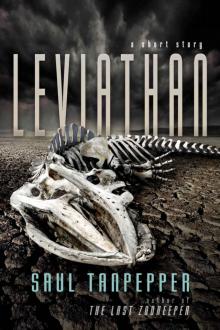 Leviathan: A Short Story About the End of the World
Leviathan: A Short Story About the End of the World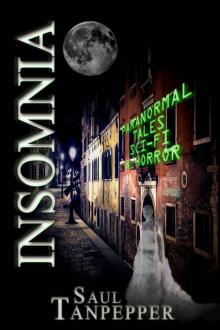 Insomnia: Paranormal Tales, Science Fiction, & Horror
Insomnia: Paranormal Tales, Science Fiction, & Horror Velveteen
Velveteen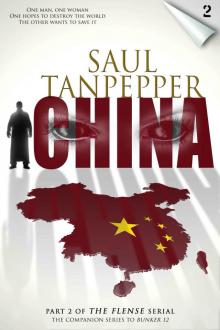 THE FLENSE: China: (Part 2 of THE FLENSE serial)
THE FLENSE: China: (Part 2 of THE FLENSE serial)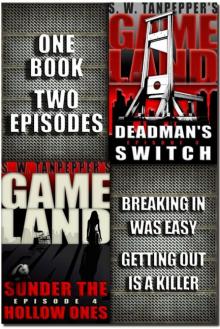 Deadman's Switch & Sunder the Hollow Ones
Deadman's Switch & Sunder the Hollow Ones